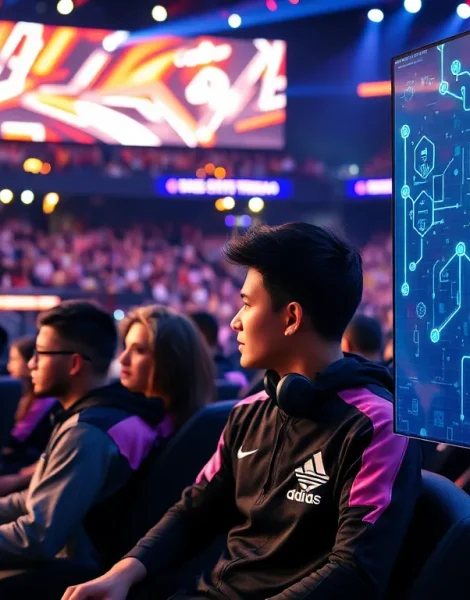Imagine a world where your in-game achievements are secured on an unchangeable ledger, ensuring fairness like never before. Sounds intriguing, right? Welcome to the realm of blockchain esports. In this evolving space, gamers can not only compete for glory but also reap the rewards of transparency and direct ownership. Immerse as we unravel the magic of blockchain and its revolutionary impact on the esports universe.
Table of Contents
ToggleUnderstanding Blockchain Technology

Blockchain technology is often described as a digital ledger that records transactions across many computers in a way that the registered information cannot be altered retroactively. This ensures data integrity and security. Each block in the chain contains a number of transactions and is linked to the previous block, creating a secure chain of information. Think of it as a digital vault, once the data is in, it stays locked in an unchangeable state. The unique aspect of blockchain lies in its decentralized nature, which distributes the data across a network of computers, making it resistant to censorship and fraud. By eliminating a centralized authority, blockchain provides an opportunity for more transparent interactions.
For esports, this transparency can be a game changer. It allows for secure and verifiable player statistics, instant payments, and the opportunity to create digital assets that players can truly own.
How Blockchain Works in Esports
In the world of esports, blockchain technology finds numerous applications that can enhance player experiences and streamline operations. Smart contracts are a crucial component of how blockchain interacts with esports. These self-executing contracts with the terms of the agreement between buyer and seller are directly written into code. This means that payments can be automatically released upon the completion of certain milestones, like tournament victories. For instance, once a player achieves a specific rank, their reward could be automatically transferred, ensuring minimal delay and reducing the risk of disputes.
Also, tokenization allows gamers to own in-game assets like skins, characters, or even virtual real estate. Players can trade these digital assets freely on decentralized marketplaces, creating an economy that’s not only transparent but also equitable. Blockchain’s ability to ensure authenticity is pivotal here: no one wants to buy a fake skin, after all.
Benefits of Blockchain in Esports
The benefits of integrating blockchain into esports are manifold. One primary advantage is the increased transparency it offers, which can help build trust among players, teams, and fans alike. In an industry often plagued by accusations of cheating or unfair practices, blockchain can provide irrefutable proof of gameplay statistics and tournament outcomes.
Also, players gain true ownership of digital assets, meaning they can buy, sell, or trade their in-game possessions without worrying about platform limitations. This democratization of asset ownership empowers gamers and enhances their engagement with games. Also, by eliminating intermediaries, players can enjoy lower transaction fees and faster payment processes, allowing them to access their rewards without unnecessary delays.
Finally, integrating blockchain into esports can also appeal to a wider audience, encouraging new players and investors to engage with the world of competitive gaming. As blockchain technology gains traction, it will not only bolster the integrity of esports but also create new business opportunities across the industry.
Challenges and Limitations
Even though its potential, blockchain technology in esports does face several challenges and limitations. One significant concern is scalability. As more transactions happen on the blockchain, it can become congested and slow, leading to delays that could deter gamers from adopting the technology. Besides, while decentralization offers enhanced security, it can also lead to issues with governance and decision-making, particularly in terms of regulation and compliance with existing laws.
Another challenge is the technological barrier for entry. Many players, especially those new to esports, may lack the know-how to navigate blockchain systems. Hence, there is a pressing need for user-friendly platforms that can make this technology accessible to the masses. Also, while blockchain aims to create a fair environment, there is the risk of digital asset speculation that can lead to market volatility, potentially harming the very gamers it was designed to protect.
Case Studies of Blockchain in Esports
Several companies are making strides in the blockchain esports arena, setting empowering examples for others to follow. One such case is Enjin, a platform that enables game developers to create blockchain-based games and digital assets. By allowing players to truly own their in-game items, Enjin is shifting how ownership and value are perceived in the gaming community.
Another notable example is The Sandbox, which allows players to create, own, and monetize their gaming experiences. This platform uses blockchain to enable user-generated content, fostering an engaged community while ensuring secure transactions for both developers and players. These platforms exemplify how innovative blockchain solutions are reshaping how games are played and monetized in the esports world. Besides, teams like the ZED RUN are enabling players to breed, race, and trade virtual horses on the blockchain, showcasing the diverse applications of this technology.
Future Trends in Blockchain Esports
Looking ahead, blockchain technology is poised to further transform esports in thrilling ways. One trend to watch is the rise of decentralized esports organizations. By leveraging community-driven governance models, these organizations can eliminate central authorities, fostering a sense of ownership among participants and promoting fairness. Another exciting trend is the integration of NFTs (non-fungible tokens) in esports. NFTs can represent rare in-game items or even player highlights, allowing fans to purchase and trade unique collectibles. This could lead to a brand new layer of fan engagement and monetization strategies for teams and players alike.
Also, as blockchain technologies continue to mature, interoperability between games, platforms, and digital assets is becoming more viable. Imagine playing multiple games using the same character or skin across numerous environments, now that’s the future players dream about. With such advancements, the landscape of esports could become even more immersive and rewarding than it already is.









